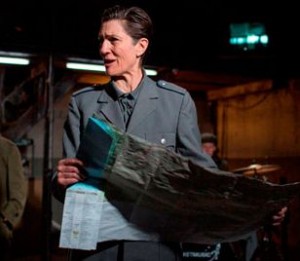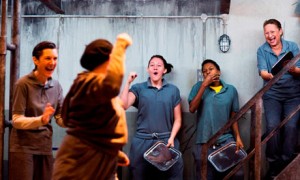Phyllida Lloyd’s all-female production of Julius Caesar has now opened to great reviews: here are two from the Guardian and the Observer. More information, including an image gallery, is available on the Donmar Warehouse’s website.
The production has created quite a stir, with Phyllida Lloyd taking the opportunity to state that major companies like the Royal Shakespeare Company should employ equal numbers of men and women in all areas, especially directors and actors, and bring in gender-blind casting. In view of this stance I’m rather surprised that Lloyd has felt the need to give her production a “frame”, setting the play in a women’s prison, the production being put on by the inmates. There’s a strong tradition of plays working like this: the Marat-Sade is set in a lunatic asylum, and The Churchill Play in an internment camp, but the best-known is Shakespeare’s play The Taming of the Shrew where the “play” is performed by a group of touring actors before a lord and his guests. Certainly with Shakespeare’s play the effect is to distance the main action from the audience: it feels like a harder play when the frame is left out. I haven’t seen the Julius Caesar yet so can’t comment but I hope the frame is justified because as a technique it can be overused.
Lloyd’s comments about the RSC’s employment policy has been much discussed: Michael Dobson speaks for many when he suggests that casting should be an artistic decision, not forced on companies, and Mark Lawson makes the same point. Greg Doran has reminded us that six of the plays in the RSC’s current and forthcoming season are to be directed by women, and that the RSC has often cast women in men’s roles: the Bastard and the Cardinal in King John were both played by women earlier in 2012. Doran’s first two major appointments were both women: Executive Director Catherine Mallyon and Deputy Artistic Director Erica Whyman. And he’s also stated “We have future plans to further explore the issues surrounding women in theatre, and a company with a 50:50 split of male and female actors is one that I’ve already challenged Phyllida to come and run in Stratford-upon-Avon”. So perhaps Phyllida Lloyd will be putting her money where her mouth is quite soon, and it will be interesting to see where the all-female Julius Caesar leads her next.
Just in the last few days there’s been a further development, with the Guardian raising the issue of why women are under-represented in the theatre in general, especially since drama schools have a larger intake of girls than boys and the majority of the audience for live theatre is also female. Yet the ratio of plays written by women is poor compared with those by men, and there are fewer female directors, designers, composers and actors. I’m putting in links to several posts including some statistics that make the point.
You can understand the frustration of women in the theatre because it seems that little has really changed, particularly among the publicly-funded national companies. Apart from actresses the best-known women in theatre within the last century have been Lilian Baylis, the manager of the London Old Vic from 1912 to her death in 1937, particularly famous for her work producing Shakespeare’s plays, and Joan Littlewood, who gained an international reputation for her left-wing Theatre Workshop, mostly at the Theatre Royal in Stratford, East London, between 1945 and 1975. Neither particularly favoured women in the theatre, and neither left a lasting legacy for women. There are now a number of women theatre directors and women in control of theatres but none with the influence of either of these two. Phyllida Lloyd’s suggestion is to create a level playing field by force: Let’s hope the RSC challenge becomes a reality: a 50:50 company is a fascinating prospect.





Great post. I wonder how it changes the play to have an all-female cast. I suppose it shouldn’t make a difference, but it’s fun to think about when it comes to these works that we have read again and again and imagined our own actors in the roles. I have tweeted the post, if that is okay.
Thanks for the post, Sylvia. Given that Julius Caesar is a play about the downfall of a powerful man, it’s certainly an interesting choice for an all-female cast to perform. Waxwings Productions in Boston, Mass. has made a similar choice — they’re putting on Doctor Faustus with an (almost) all-female cast: http://www.waxwingsproductions.webs.com/.